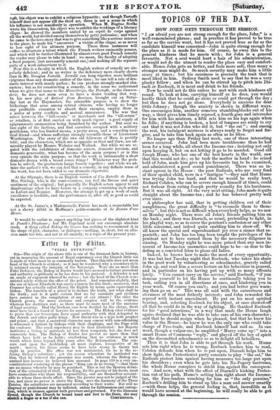tettr tu flit (Mtn.
"FIDEI DEFENSOR."
Stit—The origin of the above title is one of the foremost facts in history,
yet in measuring the amount of Royal supremacy over the Church little use Is made of what must be so commonly known. That this title does not mean head of the Church is evident; so it may be wondered why a secondary style is retained among the insignia of the Sovereign. Were she no more than Fidei Defensor, the Bishop of Exeter would have no need to torture precedent and authority so pitilessly as he has done in his pastoral. A defender is not an oracle or exponent whereof he serves ; but the head of the Church is re- stricted solely without the office of the priest. And remember slightly, that the sex of Queen Elizabeth was surely a reason for this limit; moreover, that Creamer has actually called Henry the Eighth by terms quite equivalent to bishop. Tho function of a priest is to declare the truth, not what shall be the truth ; and is it quite certain that no lay canonists and civilians have assisted in the compilation of any of our rituals ? The older the Church grows, the more abstruse and complex will be the evidence whereon her doctrines rest; so there must be more need of the anatomy of legal scrutiny. Had the Gorham case been decided by the clergy, there must have been a board of lawyers for assessors. The Bishop cites evidence to prove that our Sovereigns have equal authority with that delegated to the Jewish and other godly kings. Now David was in a type both prophet and priest ; and that a sacerdotal character may concur with non-officiating is witnessed a fortiori by bishops with their chaplains, and the Pope with his confessor. The royal supremacy may be thus illustrated : her Majesty institutes a bishop to spirituals no less than tempera's, but she does not consecrate him. The Bishop of Exeter has proved no more than that others have held as he holds; overlooking that no evidence is much worth which dates beyond fifty years after the Reformation. The cen- sure cast upon the Archbishop all must deplore, irrespective of its merit : indeed, his Grace seems to have been wrong in theory but right in practice. His office was not ministerial, for he is the re- fusing Bishop's substitute ; yet the reason wherefore he instituted was this, that he believed the presentee was sound, whereas the Bishop ex- amined him because he believed him unsound. In page 110 is a very un- constitutional rendering of the phrase "King can do no wroug,"—that there are no means whereby he may be punished. This is but the Spartan defini- tion of the criminality of theft. The King, for the gravity of his deeds, must have counsellors who share his responsibility, and are themselves account- able to whom these deeds affect. Since the greater may not be judged of the less, and since no power is above the King, save the harmony of the Three Estates, the substitutes are measured according to their works. But still no disgrace or punishment may be inflicted, unless for faithlessness and corrup- tion, which is treason against both governor and governed. For the Diocesan Synod, though the Church be bound hand and foot to the State, she may


























 Previous page
Previous page